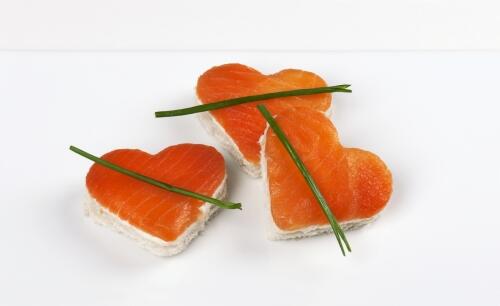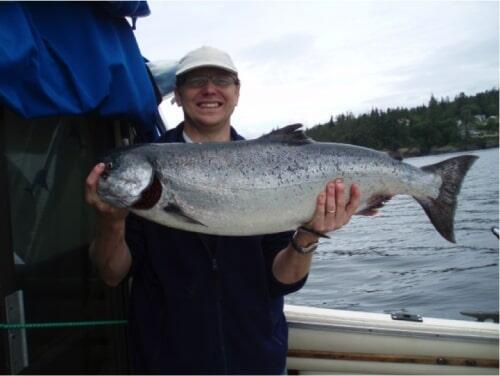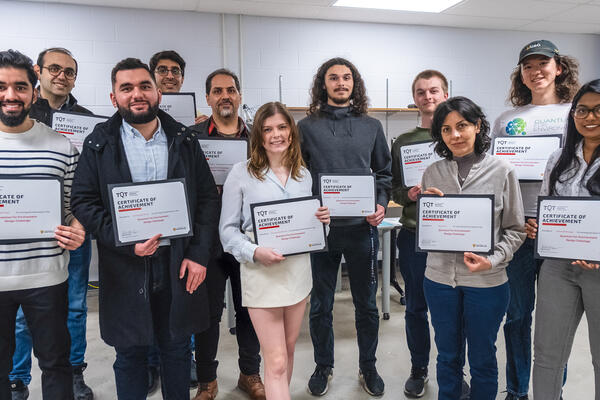
True love makes pacific salmon healthier
Salmon can spot their true love across a crowded stream, according to research from a university-industry partnership.

Salmon can spot their true love across a crowded stream, according to research from a university-industry partnership.
By Media RelationsSalmon can spot their true love across a crowded stream, according to research from a university-industry partnership involving the University of Waterloo. Allowing female salmon to follow their heart and mate with the male of their choice produces healthier babies than those who have their mates selected for them.

Heart-shaped salmon crudités (©iStock.com/beyhanyazar)
Open breeding is just one of many unconventional practices in salmon aquaculture developed by the University of Waterloo, Yellow Island Aquaculture, Ltd. and five other Canadian universities.
Professor Brian Dixon, of the Faculty of Science at Waterloo, is investigating the immunology of these fish on a molecular level to understand why these breeding strategies produce a superior salmon. He holds the Canada Research Chair in Fish and Environmental Immunology.
The research team’s work has helped Yellow Island to become the first commercial salmon farm in Canada to raise certified organic Pacific Chinook salmon.
“Our research has resulted in high-quality salmon for some of the best restaurants in Vancouver,” said Professor Dixon. “The biggest challenge with raising native Pacific Chinook salmon is keeping them healthy. One sick fish can wipe out an entire stock. By creating a more robust stock from the ground up we avoid using antibiotics and vaccines, which are both costly to producers and stressful for the fish.”
To boost resistance, Professor Dixon exposes some salmon to different diseases. Next, the survivors are reintroduced to the main stock and allowed to breed naturally. The new immunity is passed onto the next generation and the overall strength of the stock increases.
“Diseases and parasites that should normally produce up to 80 to 90 per cent mortality, now only cause 20 per cent mortality in the Yellow Island stock,” said Professor Dixon.

Professor Brian Dixon
This innovation has earned the company and the researchers a 2013 NSERC Synergy Award which will help the team expand their breeding program. This award recognizes outstanding partnerships between industry and universities.
This project highlights the vital role and benefit of aquaculture research. Wild fisheries peaked 18 years ago but the human population continues to grow.
"If we expect to continue eating fish as a main source of protein, we need to work out ways to make aquaculture environmentally friendly and socially acceptable," said Professor Dixon.
More information about Yellow Island Aquaculture’s marine research facility is available online.
In just half a century, the University of Waterloo, located at the heart of Canada's technology hub, has become one of Canada's leading comprehensive universities with 35,000 full- and part-time students in undergraduate and graduate programs. Waterloo, as home to the world's largest post-secondary co-operative education program, embraces its connections to the world and encourages enterprising partnerships in learning, research and discovery. In the next decade, the university is committed to building a better future for Canada and the world by championing innovation and collaboration to create solutions relevant to the needs of today and tomorrow. For more information about Waterloo, please visit www.uwaterloo.ca.
-30-
Pamela Smyth
University of Waterloo
519-888-4777
www.uwaterloo.ca/news
@uWaterlooNews
Attention broadcasters: Waterloo has facilities to provide broadcast quality audio and video feeds with a double-ender studio. Please contact us for more information.

Read more
First-year students hone more than their research skills by exploring what it means to be happy

Read more
12 Waterloo students and postdoctoral fellows receive up to $10,000 in funding to develop their green-tech solutions

Read more
The Future Cities Institute founded by CAIVAN will bring together leading minds from across sectors to solve the most challenging and urgent issues facing global cities.
The University of Waterloo acknowledges that much of our work takes place on the traditional territory of the Neutral, Anishinaabeg and Haudenosaunee peoples. Our main campus is situated on the Haldimand Tract, the land granted to the Six Nations that includes six miles on each side of the Grand River. Our active work toward reconciliation takes place across our campuses through research, learning, teaching, and community building, and is co-ordinated within the Office of Indigenous Relations.